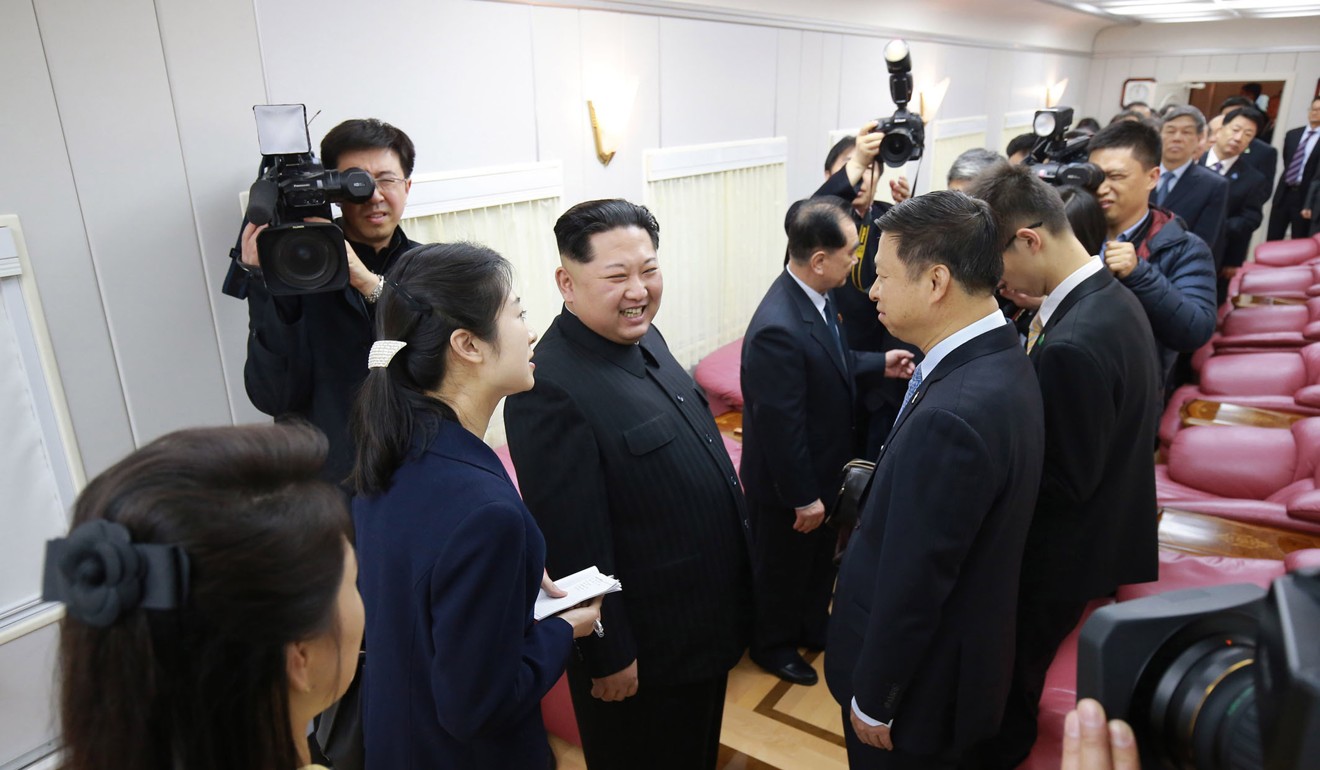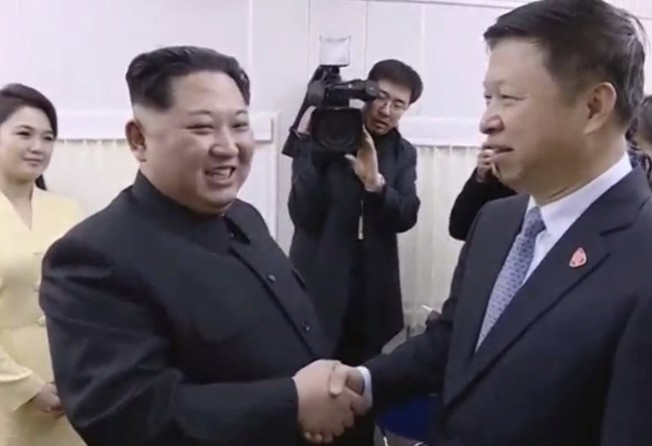
Chinese official to lead arts troupe to North Korea as nations continue their nuclear ‘dance’
As Kim Jung-un prepares for key summits with the US and South Korea, China is keen to maintain its place at the top table

A senior Chinese diplomat will visit North Korea on Friday, in a further sign of improving ties between Beijing and Pyongyang following Kim Jong-un’s landmark visit to the Chinese capital last month.
Song Tao, the head of the Communist Party’s International Department, will lead an arts troupe that will take part in the April Spring Friendship Art Festival, Xinhua reported on Wednesday.
The visit will be Song’s second to the reclusive state in five months, and comes amid a resumption of high-level exchanges designed to repair strained ties over Pyongyang’s nuclear brinkmanship, and just weeks ahead of Kim’s planned meetings with his US and South Korean counterparts.
On Monday, Kim gave a “profound analysis and appraisal” of the prospects for his upcoming summits with Presidents Donald Trump and Moon Jae-in at a meeting with senior members of his ruling Workers’ Party of Korea.
The state-run Korean Central News Agency confirmed Song’s visit, saying it would elevate friendly bilateral relations “onto a new high stage” following Kim’s “historic visit to China”.
“The Central Committee of the Workers’ Party of Korea will warmly welcome the artists of the friendly neighbouring country and specially greet them,” it said.

With the exception of 2016, China has sent performers to the arts festival in North Korea – a week-long event that forms part of the celebrations held every two years to mark the birth of Kim Il-sung, the nation’s founder and present leader’s grandfather – on each occasion since 1986.
Though Beijing has released few details of the visit by Song – whose department plays a central role in efforts to de-escalate tensions over North Korea’s nuclear weapons – analysts believe he is likely to meet Kim and convey messages from China’s President Xi Jinping.
When Song last visited North Korea in November, after China’s 19th party congress, he did not meet Kim, which was widely seen as a deliberate snub by Pyongyang as a result of Beijing’s endorsement of Washington-led international economic sanctions.
Beijing has sought to remain front and centre of the diplomacy being conducted around North Korea and is believed to be wary of Kim’s groundbreaking meeting with Trump after years of failed attempts to halt Pyongyang’s nuclear armament programme.
Kim’s surprise four-day visit to Beijing last month helped not only to shore up the traditional alliance between China and North Korea, but also sent a strong message to Washington and Seoul that amid Trump’s repeated threats of military strikes, Pyongyang still has a powerful ally.
Boo Seung-chan, a research fellow at the Yonsei Institute for North Korean Studies in Seoul, said Kim was expected to meet Song, as he needed Beijing’s strategic support before going into his high-stakes summits.
If his meeting with Trump were to end in failure, Kim would need Beijing – his principal economic and diplomatic supporter – more than at any other time to secure the survival of his regime, Boo said, adding that he was preparing for the worst.
“North Korea is using a hedging strategy,” he said. “President Trump may demand something that Kim could never accommodate in the upcoming summit. By meeting with Song and patching over relations with China, he is trying to build a safety net for his regime.”
Park Byeong-seug, a South Korean lawmaker and member of the Democratic Party of Korea, said Song was also likely to convey the results of China’s high-level exchanges with South Korea in Seoul last month, including the meeting between Beijing’s top diplomat Yang Jiechi and Moon.
The announcement of Song’s visit came after Kim confirmed his willingness to conduct diplomacy with Pyongyang’s arch-rival Washington during a meeting with his most senior officials.
According to KCNA, Kim presented strategies and tactics to address the “development of the Korean peninsula situation” but made no specific reference to “denuclearisation”.
Trump said on Monday that the summit was expected to happen in late May or early June, and that “hopefully we’ll be able to make a deal on the de-nuking of North Korea”.
Analysts say that Washington and Pyongyang have different definitions of “denuclearisation”, and that while Kim is keen to appease Washington, he does not want to upset the North Korean people by suggesting the country is about to surrender its nuclear capabilities.
The White House has made Pyongyang taking steps to disarm its nuclear arsenal a precondition for the bilateral summit, but Kim has said he will agree to denuclearise only if the US provides assurances of his country’s security, which may include the withdrawal of US troops from South Korea.
Yang Moo-jin, a professor at the University of North Korean Studies in Seoul, said Kim was aware that denuclearisation would top the upcoming summits.
“But it may be premature for him to tell his people about it at the moment as he has repeatedly said that ‘talks for denuclearisation’ would not be acceptable,” he said.
Despite Kim’s recent conciliatory moves, “it is going to take quite some time for him to explain it to his ruling party and North Koreans”, he said.
Nonetheless, Yang remained upbeat about Kim’s summit with Trump.
“I don’t doubt his [Kim’s] will to denuclearise, as he has already shown his willingness to do so to the US, China and South Korea,” he said. “As long as the survival of the regime is guaranteed, he will make his move for denuclearisation.”
But James Kim, a research fellow with the American Politics and Policy Programme at the Asan Institute for Policy Studies in Seoul, was more cautious about a possible breakthrough from the US-North Korean summit.
“North Korea has not yet made any detailed plans for denuclearisation,” he said. “We also do not know how much the US will demand [from North Korea], or how much the North may accommodate [the US]. The upcoming summit is a starting point rather than a finish line.”
The KCNA report said that while talking about the inter-Korean summit to be held at Panmunjom on April 27, Kim expressed his willingness to reconcile with Seoul, and discussed the “direction of the development of North-South relations”.
A South Korean diplomatic source said that Beijing welcomed any move by Kim to keep Beijing in the loop with regards to the talks on denuclearisation.
“North Korea needs the assurance from China, and China wants to exert its influence on the peninsula through North Korea,” the person said. “It seems like Kim is opening doors for China to be part of the talks.”
Yang said Beijing was keen to prevent the collapse of the Kim regime and secure the stability of the Korean Peninsula, and would therefore be “more than interested” to participate in the peace talks.